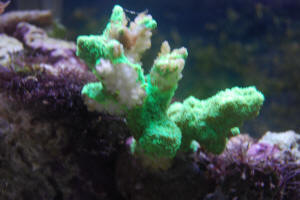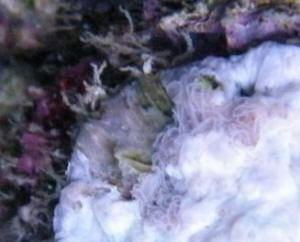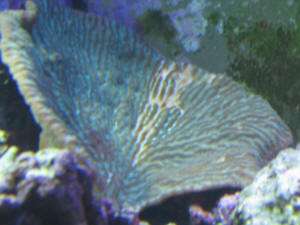|
FAQs about Merulinid Corals
Disease
Related Articles: Merulinids, SPS
Corals,
Related FAQs: Merulinids 1, Merulinids 2, & FAQs on: Merulinid Identification, Merulinid Behavior, Merulinid Compatibility, Merulinid Selection, Merulinid Systems, Merulinid Feeding, Merulinid Reproduction/Propagation,
& Stony/True Coral,
Coral System Set-Up, Coral System Lighting, Stony Coral Identification, Stony Coral Selection, Coral Placement, Foods/Feeding/Nutrition, Disease/Health, Propagation, Growing Reef Corals, Stony Coral Behavior, SPS Identification, SPS Behavior, SPS
Compatibility, SPS Selection,
SPS Systems, SPS Feeding, SPS
Disease, SPS Reproduction,
|

|
|
Coral eating itself???
3/10/11
Hello Crew!
<Hey Mark>
I seem to be having a very odd problem with the health of one of
my Coral.
My Hydnophora appears to be eating itself.
<I see this>
It seems to have started earlier today when I noted that the
corner of the colony was starting to deteriorate.
At first I thought it might be Tissue Necrosis or some bacterial
disease, but after a few hours of observation it looks more like
neighboring polyps are eating each other.
<Mmm, don't think so>
Those polyps have their guts/filaments thrown out over the other
nearby polyps, and in their wake they leave ravaged flesh of
their own colony.
I read up as much as I could on common coral diseases but I
can't find anything that even seems to hint as to what's
going on here.
Attached a picture with this message of the affected area(and no
the coral is not bleached, my camera and reef tank lighting just
don't get along)
Like I said, I am really at a loss here as I initially suspected
necrosis, but I have never seen anything like this before or
referenced to.
Kindest Regards
Mark
<The reddish area near the mal-affected portion of the
Hydnophora is my prime suspect... Perhaps Cyanobacterial... If it
were mine and not too hard to do, I'd move this stony coral
colony to another "less red" area in this or another
system. Bob Fenner>
|
|

|
Re: Coral eating itself???
3/10/11
Hey Bob, thanks for your reply.
<Welcome Mark>
I really didn't even consider Cyanobacterial as a possible
cause because I assumed it was coralline as it did not look slimy
or come off when squirting at it with a baster, nor is any of it
in actual contact with the colony, but it could also possibly
explain what's happened next.
<Ah yes... the Monerans we grossly group together as BGA are
of many different colours, physical types... A small scrape and
look under a 'scope will quickly ascertain which Division,
whether this is a Thallophyte or no>
I felt I could not wait for a reply so I got out the hacksaw and
fragged the affected area.
<Mmm, another approach!>
There has been no new degradation since, and the fragment I
removed which I decided to try and salvage and moved to another
part of the tank has also stopped degrading.
So far things are looking normal again, but I will update you if
anything new happens.
Kindest Regards
Mark
<And you, BobF>
Re: Coral eating itself??? 3/30/11
Hello again!
<Mark>
Looks like my troubles with this colony still isn't over.
I has soon been almost 3 weeks since we last communicated and
I'm afraid my Hydnophora colony still is not
doing very well.
What is more, small patches on the main colony still seem to
vanish in a similar manner to that which prompted this original
message exchange, though I have not observed anything that could
be eating the colony, day or night.
The colony still has its normal color but refuses to open at
all.
However the rest of my reef is perfectly healthy, from Shrooms
and Zoanthids, Hammers and Brains to Monti's and Birds
Nests.
<... the first three are very toxic... esp. towards
"newcomers". Did we discuss allelopathy last time? Did
you read on WWM re acclimating new Cnidarian life to established
systems?>
Even an increased frequency of water changes and carbon
replacement has not done anything for it.
<And won't>
And I have kept the rock that the colony is encrusted on free of
any trace of cyanobacteria.
Frankly, I am at a loss of as what to do about this slow
deterioration and refusal to open, and the only thing out of the
ordinary is that a few days before my problems started I
re-aquascaped, but that's all and I did not add any new
livestock or rock to the tank.
Hope you can figure out what may be going on so I can nurse this
guy back to health.
Kindest Regards
Mark
<Read here: http://wetwebmedia.com/cnidcompppt.htm
and the Compatibility FAQs for Corallimorpharians, Zoanthideans,
the genus Euphyllia/family Caryophylliidae on WWM. BobF>
|
Hydnophora health decline. Env. and
allelopathy 6/21/07 Hello guys, how's things?
I'd like some help here, I'm having a Hydnophora that seems to
be dying <dying> there are a number of factors this could be
attributed to so i would like help in narrowing it down. The problem
started a few weeks ago, my Hydnophora simply just refused to inflate,
i <I> was also having problems with summer temperatures, it was
abnormally hot and tank temperatures were fluctuating with up to 6
degrees <Yikes! Too much> over 24 hours, down to 78-79 and
peaking at about 84, i managed to get that under control with a fan.
Then i also noticed that one of the surface powerheads had quit and a
thick scum layer on the surface formed, i did note some of my Palythoa
loose some color. <Both trouble> after a week or two of not
inflating it finally browned out, and now i am seeing bare skeleton in
the brown areas which suggest to me a tissue necrosis of sorts. I also
have a briareum colony in the tank, <...> possibly and possibly
not toxic <More likely so> (frequent water changes and carbon
usage), my candy cane and Favites brain who are both very very close to
it seem unaffected (just a few inches away, measured between expanded
polyps). with all these problem thou the other colonies have remained
healthy including my Montipora that's growing like a weed, i did
however note my Zoa frag being closed up alot <No such word> of
this period but seems to now open up again after i cleared the surface
scum. I have checked the water parameters, nitrate, calcium, PH,
hardness etc. and they all check out fine. Short summary of the
symptoms, deflated, brown out, tissue recession. so the big question,
what's killing my Hydnophora, the stress from the temperature
swings under control now) surface scum blocking out the light? now
under control) or allelopathy even thou its farther away from the
briareum colony than most of the other corals? and what can i do to
save it? Hope to hear from any of you soon, Best regards, Mark Forsling
<Is highly likely the variable environment, the encrusting Gorgonian
and Zoanthid at play here. Solutions? More water changes, carbon
filtration, moving/enlarging their world... Bob Fenner>
|
Coral Recession... Merulina - 08/05/07 Hi, <Hi Brian,
Mich with you again.> You helped me identify this a few weeks
ago and it had been doing fine. Now I am noticing some recession.
<I am not surprised. This coral is not generally not easily
kept in captivity. Merulina often suffer from tissue recession,
bleaching, decalcification and overall failure to thrive and the
causes are seldom well understood.> Any ideas? <Tissues may
be compromised by sediments and contact with other corals>
What can I do to slow, stop it? <Is difficult to say, as the
causes are not often able to be determined. You will need to keep
sediment off of this coral. Keeping your water quality as high as
possible with frequent water changes and regular carbon
replacement may help. Borneman recommends generally leaving this
coral alone and untouched. He further recommends keeping this
coral under strong lighting and a good distance from any
potential allelopathic organisms. Merulina grow quite slowly so
if, and a big if here, it does recover it will likely take a good
bit of time. I'm sorry, I wish I had better news for you.>
See attached pic. <Got it. Thanks, Mich>
Coral Recession... Merulina - 08/05/07 <Hello again
Brian, Mich here.> Guess I deserve it for not doing my
research before I purchased. <We are all human and hopefully
we learn and grow from our mistakes.> Need to practice what I
preach. <Yes, don't we all?> Actually we need a mobile
solution to be able to look something up at a LFS in the case we
see something we like that we do not know what it is. Here's
an idea for a new web site. <<RMF has seen some shops
making Net access avail... where folks can easily "look
up" at least what there is to find thus>> You email a
picture of a coral and it emails back info about it. Just need a
coral identifier system :). <Heehee! Actually Jake Adams is
working on a mobile coral reference guide that can be down loaded
to your MP3 player. See his website here:
http://www.coralidea.com I hope you find this helpful.
Mich>
|
|

|
|
Hydnophora Dying -- 09/08/07 I wondered if
you could help me with my Hydnophora frag which has been doing
well i my tank for half a year now, recently i have been seeing
major tissue recession from the main body, and exposure of the
skeleton, its gradually got worse and worse and i don't know
what to do i wondered if you can be of any help at all. All my
parameters of course are fine, <Hmm... what does
"fine" mean exactly? These corals need your water
chemistry to be as close to natural sea water as you can get it.
(i.e. salinity 1.025-1.027sg, calcium 410 to 420ppm, alkalinity 3
to 4 mEq/L, etc. Always keep in mind that what's
"fine" for one coral might not be so fine for another.
You'd be surprised what I can get some species of Zoanthids
and clove coral to grow in. But Hydnophora is a bit more
picky.> recently lost a Ricordea which may have caused this
what do you think? <I doubt it, unless maybe if the tank is
really small.> The Ricordea did start to disintegrate due to
too high water flow causing it to be moved around. <It might
not be disintegrating. It might have just scrunched up and let go
to find a better spot.> please help it looks so gorgeous and i
understand they are not the easiest of corals to keep but that is
why i took up the challenge, but my hopes have been dashed by
this recent event and i am at a loose end. I hope the picture
helps you with your diagnosis. <These corals often suffer
frightening tissue recession before getting truly settled into a
tank. But they're also known to make some heroic recoveries.
Do you feed it anything? If not, that's likely part of the
problem. Keep it under strong light and moderate water flow and
start target feeding it. If you have to, turn the pumps off for
an hour or so while feeding.> Yours Laurence Sykes <Good
luck, Sara M.>
Hydnophora Dying 9/10/07 I wondered if
you could help me with my Hydnophora frag <Forgive me if I
already answered this email. I can't seem to find my response
anywhere so I'm afraid maybe I never sent it. Anyway, here it
goes again...> which has been doing well i my tank for half a
year now, recently i have been seeing major tissue recession from
the main body, and exposure of the skeleton, its gradually got
worse and worse and i don't know what to do i wondered if you
can be of any help at all. <This is typical for Hydnophora
which is not yet settled into a tank.> All my parameters of
course are fine, <Hmm... what is "fine" exactly?
What's fine for one coral might not be fine for another.
Hydnophora need water parameters as close to natural seawater as
possible (calcium 410 to 420ppm, salinity 1.025 to 1.027,
etc.)> recently lost a Ricordea which may have caused this
what do you think? <Highly unlikely unless the tank is really
small.> The Ricordea did start to disintegrate due to too high
water flow causing it to be moved around. <It might not be
disintegrating. It likely scrunched up and let go to try to find
a better spot.> please help it looks so gorgeous and i
understand they are not the easiest of corals to keep but that is
why i took up the challenge, but my hopes have been dashed by
this recent event and i am at a loose end. <It's quite
common for these corals to suffer frightening tissue recession
when not well established in a new tank. Fortunately, they're
also capable of heroic recoveries. Do you feed it? If not, that
might be part of the problem. Try target feeding it (turn off the
pumps for an hour or so if you have to).> I hope the picture
helps you with your diagnosis. <not doomed yet... could
definitely come back with some TLC> Yours <Good luck,
Sara M.>
|
|

|
|
|

